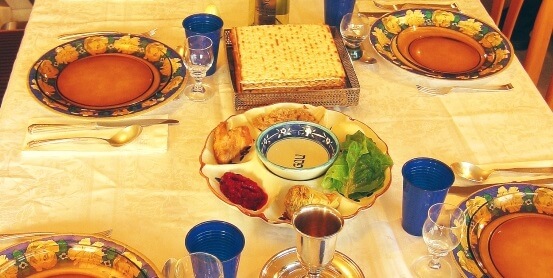
Together or separate? The Sages disagreed on how one should eat the matzah and maror (bitter herbs) at the Passover Seder.
The Talmud in Berachot 49a admonishes us not to perform mitzvot “bundled together” (chavilot chavilot). We do not want to give the impression that mitzvot are an unwanted burden, an obligation that we wish to discharge as quickly as possible. For this reason, the majority opinion is that the two mitzvot of eating matzah and maror should be performed separately.
But Hillel’s custom was to place the pesach offering and the maror inside the matzah and eat them together like a sandwich. Why did Hillel combine these mitzvot together?
Matzah and Freedom
To understand Hillel’s opinion we must first examine the significance of matzah and maror. Matzah is a symbol of freedom. But what is freedom? Freedom does not mean sitting idle and unoccupied. True freedom means the opportunity to grow and develop according to one’s inner nature and natural gifts, without interference or coercion from outside influences. This freedom is symbolized by matzah, a simple food consisting solely of flour and water, unaffected by other ingredients and chemical processes.
In order to form the Jewish people as a holy nation, their national character needed to be independent of all foreign influences. They left Egypt free from the spiritual baggage of Egyptian culture. Thus we find that in preparation of bringing the Passover offering, they were commanded to “draw out and take for yourselves sheep” (Exod. 12:21). What does it mean to “draw out”? The Midrash explains that they needed to remove from within themselves any affinity to Egyptian idolatry (Mechilta ad loc).
With a clean slate, lacking any national character of their own, a holy character could then be imprinted on Israel’s national soul. This is part of the metaphor of matzah: it lacks any shape and taste of its own, so that the desired form and flavor may be properly imposed upon it.
The Message of Maror
Maror is the opposite of matzah; its bitterness is a symbol of servitude. But even servitude may have a positive value. An individual whose life’s ambition is to become a doctor must spend many years in medical school to achieve this goal. The long years of concentrated effort require great dedication and discipline. These years are a form of servitude — but a servitude that advances one’s final goal, and thus is ultimately a true expression of freedom.
This idea may also be applied to the Jewish people. Our souls are ingrained with a Divine nature, but we suffer from character imperfections that prevent us from realizing our inner nature. For this reason we need to accept upon ourselves a pleasant form of servitude, the service of God. We acquired this ability in Egypt. This is slavery’s positive contribution — it teaches one to accept the deferment of immediate desires and short-term goals.
This is the central message of maror: acceptance of life’s bitter aspects, with the knowledge that this forbearance and resolve will allow us to attain higher objectives. For this reason, we eat the maror only after eating the matzah — only after we have clarified our ultimate goals.
Discipline and Freedom
Now we may better understand the disagreement between Hillel and the other sages. Freedom, as symbolized by the matzah, reveals the inherent holiness of Israel and our natural love for God and Torah. This innate character enables us to overcome desires that do not concur with our elevated goals. It is through our persistence and dedication to the overall goal that we reveal our inner resources of freedom.
Both of these traits, freedom and servitude, need to be free to act without interference from one another. When a spirit of freedom and independence is appropriate, it should not be constrained by a servile attitude; and when discipline and a sense of duty are needed, they should not be disrupted by a desire for freedom. Thus, according to the majority opinion, we should eat the matzah and maror separately, indicating that each trait should be expressed to its fullest.
The ultimate goal, however, is attained only when we recognize that these two forces do not contradict one another. Joined together, they present the highest freedom, whose nobility and power is fully revealed when it wears the crown of lofty servitude — the service of the Holy King, a service that is freedom in its purest state.
Thus Hillel would eat the matzah and maror together. He sought to emphasize that freedom and slavery are not contradictory concepts. Generally speaking, the quality of servitude belongs more to the preparatory stage; but in the overall picture, the two forces are interrelated, complementing one another to attain the final goal.
(Silver from the Land of Israel. Adapted from Olat Re’iyah vol. II, pp. 287-289.) (Photograph by user:Gilabrand / Wikimedia Commons / CC-BY-2.5)





